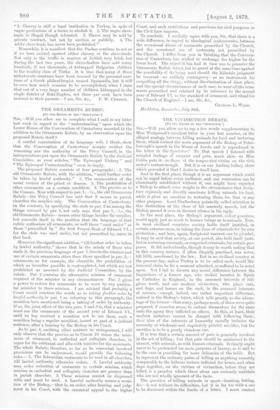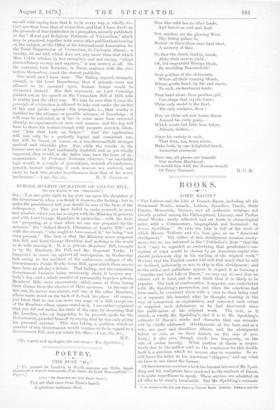THE VIVISECTION DEBATE. [TO THE EDITOR OF THE "SPECTATOR. "]
SIH,—Will you allow me to say a few words supplementary to Miss Wedgwood's excellent letter in your last number, on the alleged analogy between killing animals for food and torturing them, which formed the main argument of the Bishop of Peter- borough's speech in the House of Lords, and is reproduced in his letter to the Spectator ? To that speech I listened with mingled feelings of surprise and pain, much akin—as Miss Cobbe puts it—to those of the tongue-tied victim on the vivi- sector's torture-trough. But it is on one leading fallacy alone which pervaded it that I desire to dwell here.
And in the first place, though it is an argument which could not be urged before every audience, and our contention can be abundantly established without it, one might have expected a Bishop to attach some weight to the circumstance that Scrip- ture expressly and directly sanctions killing animals for food, while it gives no sanction to torturing them, for that or any other purpose. Lord Shaftesbury pointedly called attention to this distinction at the close of his masterly speech, but the Bishop passed it over in discreet silence in his reply.
In the next place, the Bishop's argument, valeat quantum, would apply just as much to human beings as to animals. Now, in most civilised countries society holds itself justified, in certain extreme cases, in taking the lives of criminals for its own protection ; and here, again, Scriptural warrant can be pleaded. It may be said that society, at one period, also held itself justi- fied iu torturing criminals, or suspected criminals, for certain pur- poses. It did undoubtedly, though it may be worth noting that in this country torture, if often illegally practised, was never, till 1876, sanctioned by the law. But in no civilised country at the present day, unless Turkey is to be called such, would this immoral claim be for a moment admitted, or suffered to be acted upon. Yet I fail to discern any moral difference between the Inquisitors of a former age, who racked heretics in Spain or Catholics in England, in the assumed interests of reli- gious truth, and our modern vivisectors, who place cats, and dogs, and horses on the rack, in the assumed interests of science,—except, indeed, one rather important difference, noticed in the Bishop's letter, which tells greatly to the advan- tage of the former--that many, perhaps most, of them were quite prepared, if occasion arose, to endure themselves for the same ends the agony they inflicted on others. In this, at least, their modern imitators cannot be charged with following them ; their idea of the interests of humanity equally includes the necessity of wholesale and exquisitely painful sacrifice, but the sacrifice is to be a purely vicarious one.
It is true that a certain amount of pain is generally involved in the act of killing ; but that pain should be minimised to the utmost, with animals, as with human criminals. It clearly ought never to be protracted for mere purposes of luxury, as is said to be the case in providing for some delicacies of the table. But to represent the ordinary pains of killing as anything remotely comparable to the hideous torture inflicted for hours, and often days together, on the victims of vivisection, before they are killed, is a paradox which those alone can seriously maintain who are not wholly ignorant of the facts. The question of killing animals in sport—hunting, fishing, &c.—is not without its difficulties, but it is far too wide a one to be discussed within the limits of a letter. I must content
myself with saying here that it is, in every way, a wholly dis- tinct question from that of vivisection, and that I have dwelt on the grounds of this distinction in a pamphlet, recently published, on the " Moral and Religious Estimate of Vivisection," which may be procured, together with many other publications bearing on the subject, at'the Office of the International Association for the Total Suppression of Vivisection, 25 Cockspur Street,—a Society, let me add, which does not, any more than that which Miss Cobbe advises by her exemplary zeal and energy, " adopt extraordinary secrecy and mystery," or any secrecy at all. On the contrary, both Societies, in direct contrast with the vivi- sectors themselves, court the utmost publicity.
One word, and I have done. The Bishop argued, strangely enough, as did Lord Beauchamp, that if animals were not allowed to be operated upon, human beings would be vivisected instead. But this argument, as Lord Coleridge pointed out in his speech on the Vivisection Bill of 1876, tells in reality just the other way. We may be sure that if once the principle of vivisection is allowed to take root under the shelter of law and public opinion—the principle, that cruelty is justified for the advance, or possible advance, of knowledge—it will soon be extended, as it has in some cases been extended already, to experiments on men and women; and the dog will have to share his torture-trough with paupers, convicts, idiots, and "him that hath no helper." And the application will not only be a perfectly logical and consistent one, but will be based, of course, ou a ten-thousandfold stronger medical and scientific plea. For, while the results in the former case are at best confessedly doubtful, and as yet wholly unproved, they would, in the latter case, have the force of de- monstration. As Professor Newman observes, "an inevitable logic would, in a couple of generations, unteach all tenderness towards human suffering, if such horrors are endured, and carry us back into greater heartlessness than that of the worst barbarians."—I am, Sir, &c., H. N. OXENIIAM.
SCHOOL-BOARDS (DURATION OF' LOANS) BILL.
(TO TDB EDITOR OF TRZ SPECTATOIL.1
SIE,----YOU are quite right to lay your cat upon the shoulders of the Government, when you think it deserves the lashing ; but to make the punishment tell, you should be sure of the facts of the delinquency. This you halve failed to make yourself, in your last number, where you are so angry with the Ministry in general, and with Lord George Hamilton in particular,—with the first, for " proposing, at a time when no one was prepared for the measure," the " School-Boards (Duration of Loans) Bill," and with the second, " who ought to have moved it," for being " not even present." The fact is that the Ministry never proposed this Bill, and Lord George Hamilton had nothing in the world to do with moving it. It is a private Members' Bill, brought in by Mr. Ha.nbury, Mr. Pell, and Mr. Reginald Yorke. It happened to come on, against all anticipation, on Wednesday last, owing to the accident of the unforeseen collapse of the Government's Public Works Loan Bill, upon which there was to have been an all-day's debate. That failing, and the remaining Government business being necessarily short, it became any- body's day, and a whole number of presumedly hopeless private Members' Bills were successively called, some of them losing their chance from the absence of their sponsors. In the case of this one, its mover was absent, and one of the other Members, whose name stood on the back of it, took his place. Of course, you know that no one can move any page of a Bill except one of the Members whose names stand on it. I am rather surprised. that you did not realise the state of the ease, by observing that Mr. Lowther, who, on happening to be present, spoke for the Government, guarded himself by saying that he was only giving his personal opinion. This was taking a position which no member of any Government would venture to do in regard to a Government Bill, and yet retain his office.—I am, Sir, &c.,
M.P. [We regret and apologise for our error.—En. Spectator.]



































 Previous page
Previous page